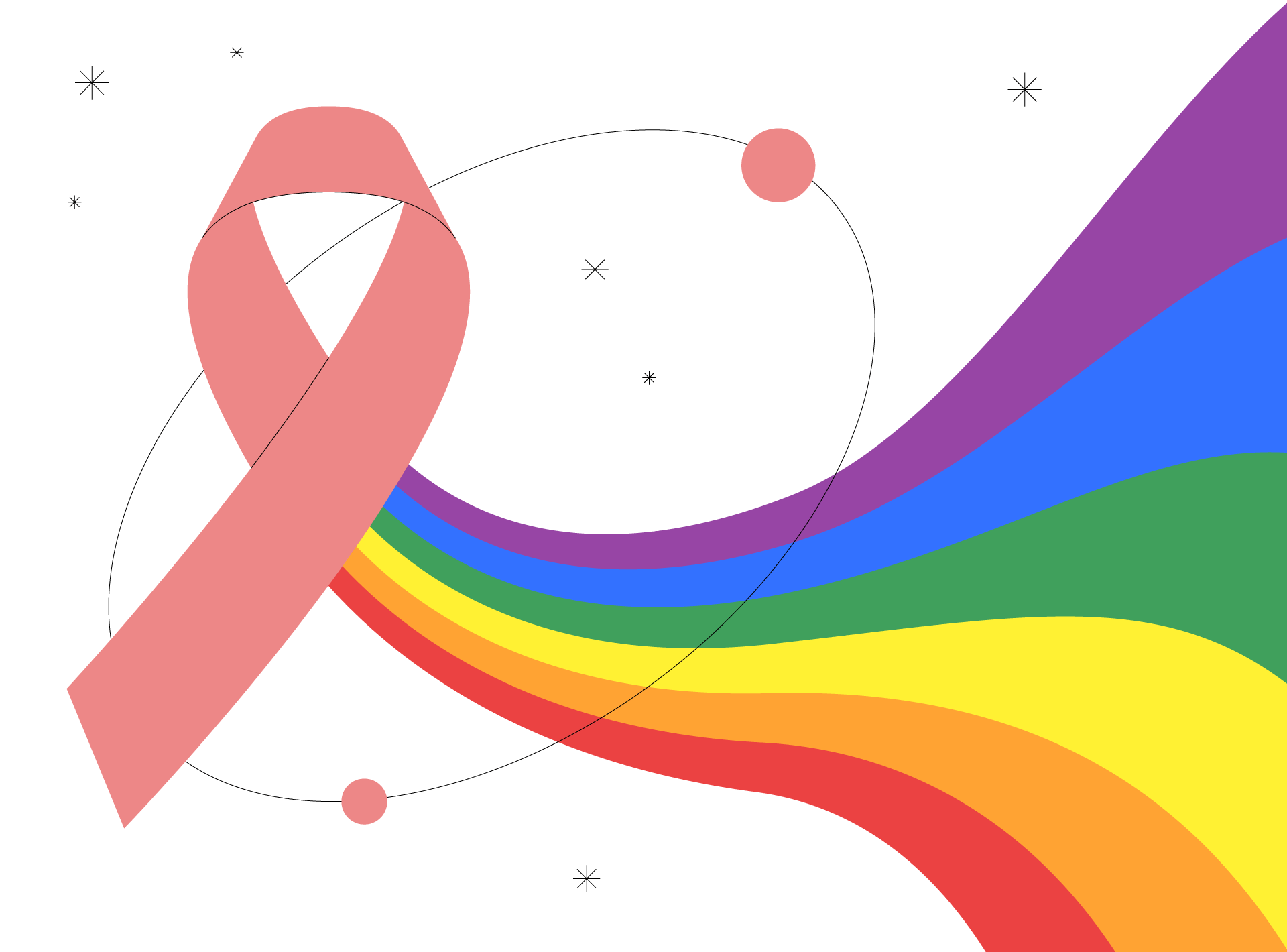Every June, thousands of brands launch ‘Pride activation campaigns’ to show how progressive they are and how great their logo looks with a multicolored design, without taking any meaningful action to support or advance LGBTQ+ rights.
Ahead of Pride in London 2019, research by Karmarama and GAY TIMES found that 72% of the LGBTQ+ community felt that their representation in advertising was tokenistic. Generational shifts have shown that marketing that is progressive and positive in its representation of the LGBTQ+ community is more important than ever, especially for younger consumers.
In recent years, the term ‘pinkwashing’ has become a major topic of discussion within the business and marketing communities. Pinkwashing refers to the practice of companies claiming to support LGBTQ+ rights or diversity initiatives primarily as a marketing strategy, rather than making genuine efforts to promote inclusion and equality. This blog post explores the concept of pinkwashing, highlights some high-profile examples, and showcases Admind’s commitment to authentic Diversity and Inclusion (D&I) practices.
Understanding Pinkwashing
The term “pinkwashing” first emerged in 1985, when breast cancer awareness advocates noticed brands using the pink ribbon—a symbol of breast cancer awareness and research funding—to market their products. These brands were criticized for co-opting the campaign while continuing to produce items containing cancer-causing ingredients.
Pinkwashing is a portmanteau of “pink” (a color often associated with LGBTQ+ movements) and “whitewashing” (covering up unpleasant facts). Companies engaged in pinkwashing use LGBTQ+ symbols, slogans, and endorsements to appear supportive of the community, but their actions do not align with these claims. This practice can be harmful as it exploits marginalized groups for profit and can undermine the credibility of genuine D&I efforts.
In today’s world, where political correctness and social responsibility are increasingly important, companies must be very careful with their actions and statements to avoid criticism. Simply using inclusive slogans and symbols without genuine backing can quickly lead to accusations of pinkwashing and damage a company’s reputation. Consumers and stakeholders are more aware and critical than ever before, and they expect transparency and authenticity from the brands they support.
To determine how PR and communications professionals can avoid pinkwashing and improve their LGBTQ+ campaigns, Commetric analyzed 2,930 English-language articles on this topic published between June 2020 and June 2022 in major media outlets. They found that the most prominent driver of pinkwashing allegations was the Donations to anti-LGBTQ+ causes or politicians that companies with LGBTQ+ branding initiatives have made:
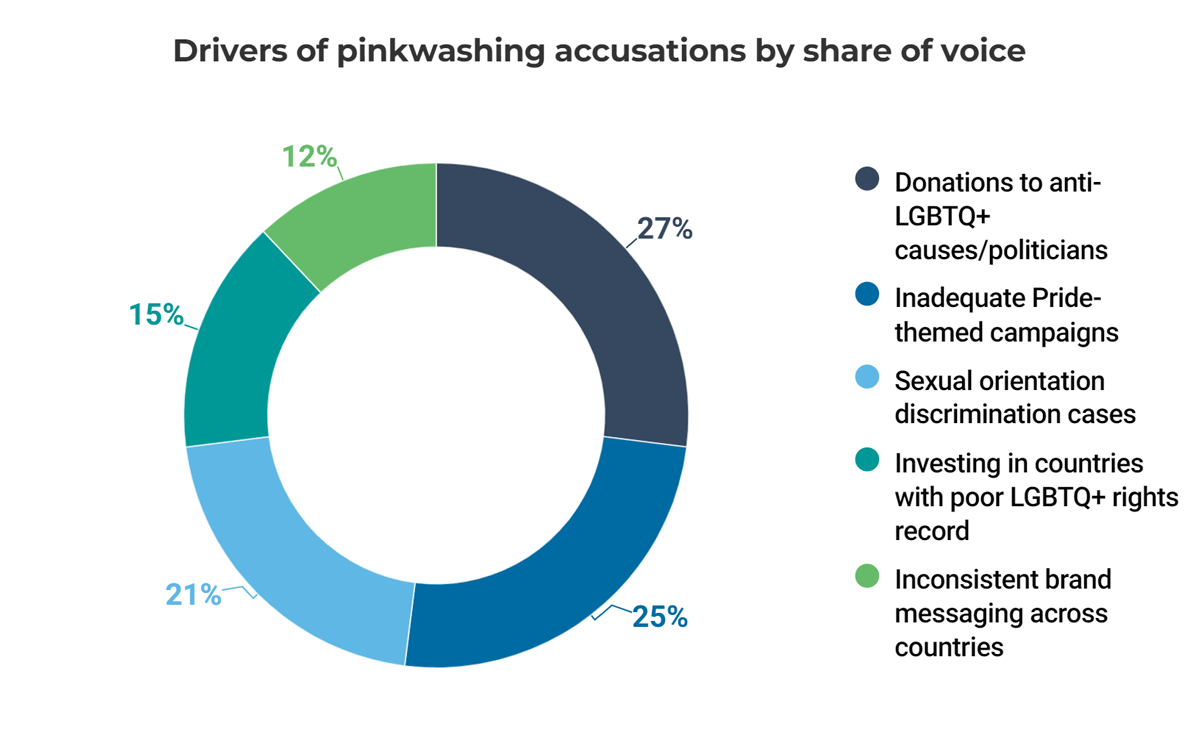
Source: How Can Brands Avoid Pinkwashing During Pride and Beyond? A Media Analysis | Commetric
Cultural Appropriation vs. Cultural Appreciation
Understanding the difference between cultural appropriation and cultural appreciation is crucial for companies aiming to respect and honor diverse cultures in their marketing and branding efforts. This distinction is also vital in avoiding pinkwashing—superficial support for social causes, including LGBTQ+ rights, without genuine commitment.
Cultural appropriation occurs when members of a dominant culture adopt elements of a minority culture, often stripped of their original context and meaning, and used in a way that can be seen as exploitative or disrespectful. This practice can perpetuate stereotypes and disregard the significance of these cultural elements to their original communities. Similarly, pinkwashing happens when brands adopt LGBTQ+ symbols and themes superficially, without making substantial efforts to support the community, leading to accusations of exploitation and hypocrisy.
On the other hand, cultural appreciation involves acknowledging, respecting, and valuing another culture. It includes taking the time to understand the history, traditions, and significance behind cultural elements and giving credit to their origins. For marketers, this means collaborating with members of the culture, ensuring accurate representation, and supporting the community in meaningful ways. In the context of LGBTQ+ rights, avoiding pinkwashing requires similar principles: understanding the community’s history and struggles, engaging authentically, and providing genuine support.
By practicing cultural appreciation rather than appropriation, companies can create more authentic and respectful connections with diverse audiences. This approach fosters genuine inclusion and helps avoid potential backlash, whether from cultural communities or the LGBTQ+ community. Embracing true appreciation and support demonstrates a brand’s integrity and commitment, ensuring their efforts are seen as sincere rather than opportunistic.
Ensuring Authentic D&I Practices
It is important for consumers, employees and partners to scrutinise companies’ Diversity & Inclusion (D&I) initiatives and look beyond slogans and marketing campaigns to see if a company’s actions match its public statements. Genuine commitment to D&I should be evidenced by consistent and transparent practices where companies regularly report on their progress and challenges; robust internal policies that include inclusive hiring and promotion practices and a supportive work environment; and active community engagement that goes beyond financial donations to support and engage with marginalised communities.
In order to connect with LGBTQ+ audiences without being accused of pinkwashing, companies should aim for a true representation of the LGBTQ+ community in their advertising, showing diverse lifestyles and families. Public commitment should start with strong internal processes, as outlined by the the Human Rights Campaign Foundation’s Corporate Equality Index, which rates companies on employee protections, inclusive benefits, support for an inclusive culture, corporate responsibility and responsible citizenship. Companies should also donate proceeds from Pride Month merchandise to LGBTQ+ causes, demonstrate substantial corporate social responsibility, and support the LGBTQ+ community throughout the year to avoid accusations of “rainbow capitalism” and show consistent, genuine commitment.
Supporting social causes should never be just a marketing trend. Authenticity and empathy must be at the heart of your communication strategy. True commitment is essential, and there’s no time to waste in making a real difference.
Notable Examples of Pinkwashing
As brands attempt to align themselves with social causes and demonstrate support for the LGBTQ+ community, many have unfortunately fallen into the trap of pinkwashing. These missteps serve as cautionary tales, highlighting the importance of genuine commitment over superficial gestures. Below are some notable examples of pinkwashing that have drawn significant criticism and backlash.
H&M: The fashion giant launched a Pride collection with the slogan “Love for All,” but faced backlash when it was revealed that the collection was not being sold in mainly-Muslim Malaysia, where gay sex is punishable by up to 20 years in prison. It was also unavailable in 20 of H&M’s 72 markets, including Kuwait, the United Arab Emirates, and Saudi Arabia, all of which ban same-sex relations.
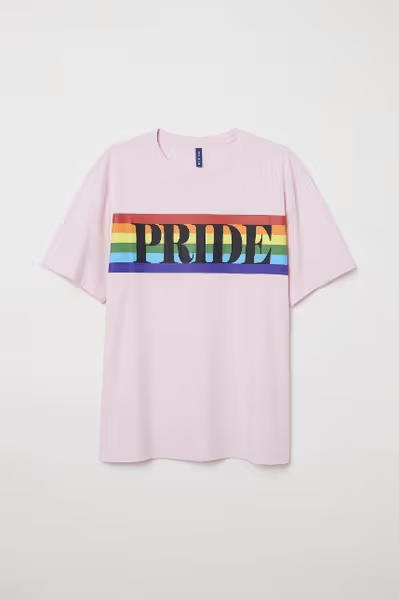
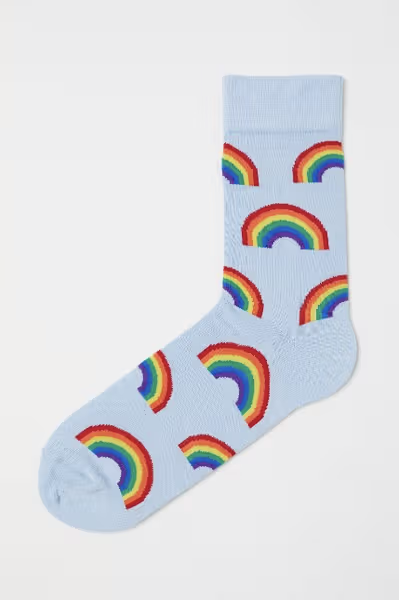
Source: https://noizz.pl/lifestyle/pierwsza-kolekcja-lgbt-od-handm/mc5k34c
Barilla: In 2013, Barilla, a renowned pasta brand, faced severe backlash when its CEO made homophobic comments. Despite efforts to mend their image, this incident serves as a reminder that brand values must align with the messages conveyed in campaigns to avoid accusations of hypocrisy and pinkwashing.
YouTube: In 2019, while YouTube ran campaigns to promote Pride Month and supported content created by the LGBTQ+ community, it faced criticism for not adequately addressing harassment and hate speech against LGBTQ+ creators on its platform. The disparity between its public stance and its failure to protect these creators led to accusations of pinkwashing.
Burger King Austria faced controversy with its Pride Whopper, featuring either two top buns or two bottom buns. While some found the burger humorous, others criticized it as offensive “rainbow washing”— the practice of companies showing surface-level support for LGBTQ+ identifying people without any specific action that could improve their lives.
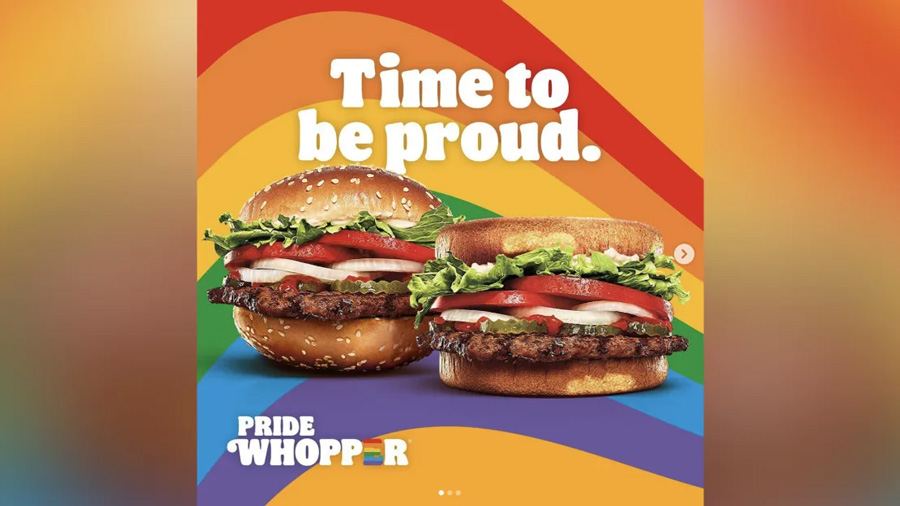
Source: Burger King/Instagram https://edition.cnn.com/2022/06/07/business-food/burger-king-pride-whopper/index.html
How to Avoid Pinkwashing?
While many brands have faced backlash for superficially supporting the LGBTQ+ community, there are ways to ensure your efforts are seen as genuine and impactful. Avoiding pinkwashing requires a commitment to authenticity, transparency and meaningful action. Companies should explore effective strategies and examples of initiatives that demonstrate true allyship and support for LGBTQ+ rights, helping brands build trust and foster long-term relationships with the community.
Focus on purpose, not hype
Ground your brand in its core values and align them with genuine social commitments. Don’t follow trends just because others are. Instead, forge your own authentic path and develop a strategy that prioritises honesty and long-term commitment. Avoid superficial ‘corporate pride’ gestures, as they are easily seen through and dismissed.
Demonstrate true inclusivity
It’s not enough to say you support diversity. Inclusivity needs to be reflected in both your external communications and internal policies. This means fostering diverse teams, ensuring equal treatment and promoting visibility in senior management. Demonstrate your commitment with measurable results that truly make everyone feel included.
Partner with impactful organizations
No brand can achieve everything on its own. Beyond producing pride-themed products and donating profits, partner with local organizations that support LGBTQ+ education, health or social issues. Build long-term partnerships and collaborate on innovative initiatives that truly align your brand with the cause.
Consistent, year-round support
Supporting the LGBTQ+ community should not be a once-a-year activity. Brands need to be consistent in their support throughout the year, with authenticity and transparency.
Educate and raise awareness
Educate your team on LGBTQ+ issues and create a safe, inclusive work environment. Provide opportunities and fair conditions for LGBTQ+ employees.
Spotlight on Our DEI Initiatives
We are proud to highlight two outstanding Diversity & Inclusion practices: our involvement in the FilmOn festival and our donation of D&I themed books to the Krakow Library. These initiatives exemplify our commitment to enriching the cultural and educational resources of our community and highlighting the importance of diversity and inclusion in all aspects of society.
Our participation in the FilmOn festival demonstrates our commitment to promoting diverse voices and stories through the medium of film. By supporting this festival, we aim to provide a platform for underrepresented filmmakers and encourage wider conversations about inclusion and representation in the arts.
In addition, our donation of D&I books to the Krakow Library is a testament to our commitment to education and cultural enrichment. This initiative ensures that valuable resources on diversity and inclusion are available to the public, fostering a more informed and inclusive community.
In addition, both projects have been nominated for this year’s Diversity Charter Award, a recognition that fills us with immense pride. This nomination not only reflects our commitment to diversity and inclusion, but also reaffirms our leadership in promoting these values through meaningful and impactful community engagement.
At Admind, we believe that true commitment to diversity and inclusion is demonstrated through consistent, authentic actions that create lasting impact. These initiatives are just a few examples of how we strive to make a positive difference in our community and beyond.
Conclusion
To avoid pinkwashing and promote genuine D&I efforts, brands must move beyond superficial gestures and commit to authentic, long-term actions. By focusing on purpose over hype, demonstrating true inclusivity, partnering with impactful organisations, providing consistent support throughout the year and raising awareness, brands can build trust and foster lasting relationships with the LGBTQ+ community.

